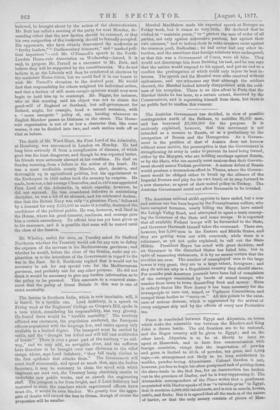The famine in Southern India, which is now inevitable, will,
it is feared, be a terrible one. Lord Salisbury, in a speech on Friday week at the Engineers' College on Cooper's Hill, spoke in a tone which, considering his responsibility, was very gloomy. He feared there would be "terrible mortality." The territory afflicted was enormous, the population scattered, the European officers acquainted with the language few, and native agency only available in a limited degree. The transport must be carried by cattle, and the "drought has killed and will kill vast multitudes of beasts." There is over a great part of the territory "no rail- way," and we may add, no navigable river, and the sufferers have therefore to be brought over vast distances to the relief camps, where, says Lord Salisbury, "they fall ready victims to the first epidemic that attacks them." The Government will exert itself strenuously, and spend so much that, says the Indian Secretary, it may be necessary to abate the speed with which engineers are sent out, the Treasury being absolutely unable to undertake new public works, and so absorb the engineering staff. The prospect is far from bright, and if Lord Salisbury had ventured to state the numbers which experienced officers know must die, it would be even blacker. We greatly fear the aggre- gate of deaths will exceed the loss in Orissa, though of course the proportion will be smaller.


































 Previous page
Previous page